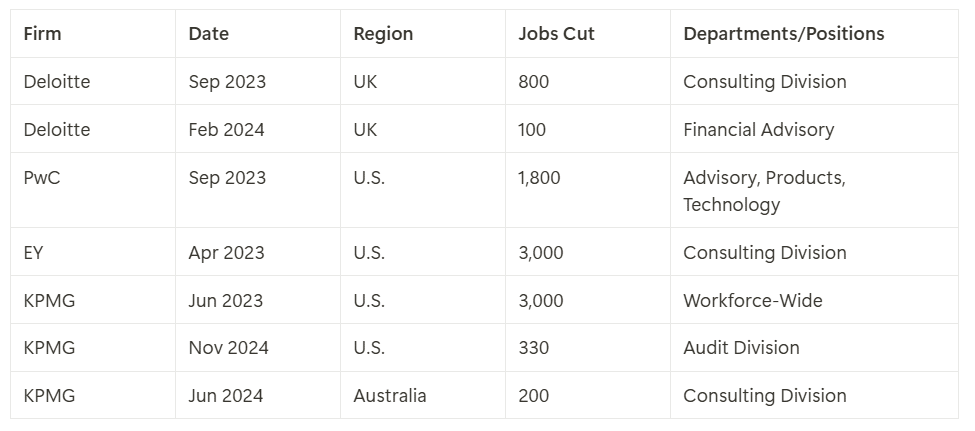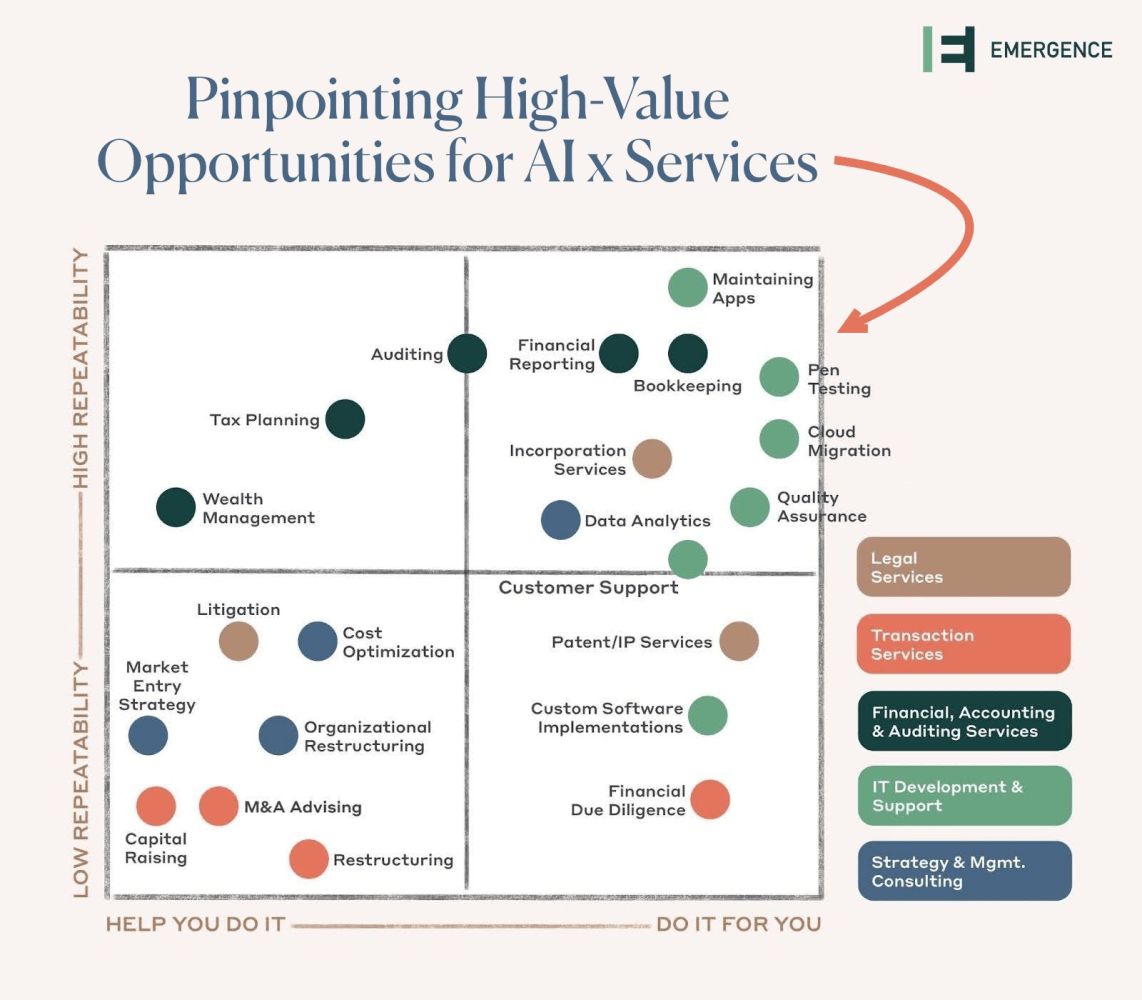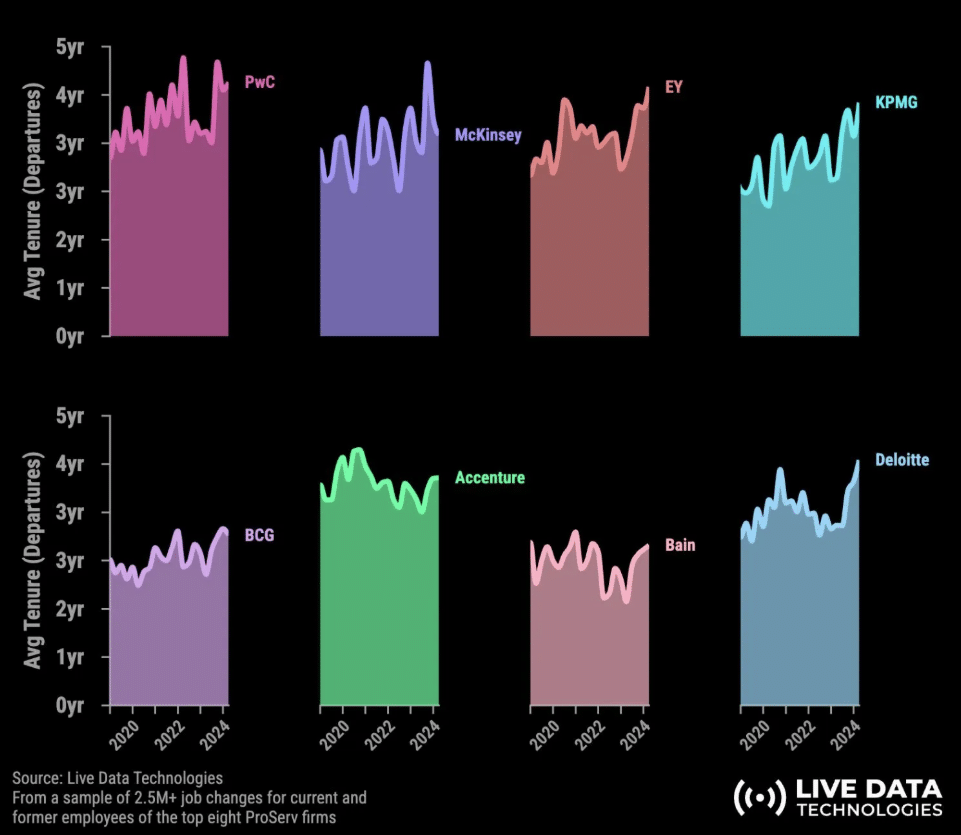From Dominance to Change: Why the Big Four Are Cutting Jobs the Rise of AI in Consulting
The Big Four firms—Deloitte, PwC, EY, and KPMG—are facing significant changes due to the rise of AI in consulting; consequently, layoffs are sweeping across their consulting divisions. This trend shows changing client needs; it also points to more use of AI and a growing choice for in-house teams instead of traditional consultancies. As the rise of AI in consulting continues, firms must adapt to this new landscape.
Chronology of the Layoffs: Who, Where, and Why in the Context of AI Adoption


Since early 2023, over 9,000 workers have lost their jobs, mainly in the U.S., UK, and Australia—especially in areas facing economic ups and downs. The cuts focus on consulting, advisory, and strategy teams, with many experienced consultants, managers, and directors being affected. Unlike other layoffs, firms are cutting back on excess staff; thus, they are concentrating on high-value, specialized services that leverage the rise of AI in consulting.
Why Is This Happening? Shifting Client Priorities Driven by AI Integration
As a result, companies are reevaluating their reliance on external consultancies:
- In-House Teams: Clients are increasingly building internal strategy and analytics teams to manage processes directly and reduce costs.
- AI Adoption: Firms are integrating AI-powered tools to automate processes, replacing much of the manual work traditionally performed by consultants. This shift is a direct consequence of the rise of AI in consulting.
- Economic Slowdown: Reduced M&A activity and tighter budgets have impacted demand for advisory services.

Emergence Capital’s April 2024 article highlighted a key challenge for consultancies: AI excels at automating highly repeatable tasks like Pen Testing, Cloud Migration, Quality Assurance, and Financial Reporting due to their standardized nature.
Nevertheless, recent layoffs reveal a clear trend: strategy-related positions are hit hardest as the rise of AI in consulting moves beyond routine tasks; in fact, it now handles data extraction, analysis, and reporting for market entry strategy—areas traditionally reserved for experienced consultants.
Internal Efficiency Gains: How AI Redefines Consulting Practices
The Big Four firms are heavily investing in AI and automation; therefore, they aim to optimize their operations.
- PwC: Committed $1 billion to embed generative AI across its services, showcasing the firm’s dedication to the rise of AI in consulting.
- KPMG: Partnered with Microsoft for a $2 billion AI initiative and an additional $100 million investment with Google Cloud.
- AI Tools in Action: Robotic Process Automation (RPA) replaces repetitive tasks like data entry and reconciliation. Natural Language Processing (NLP) tools streamline documentation, reporting, and compliance reviews.
The Bottom Line: The Impact of AI on Consulting Roles
“AI does in minutes what used to take analysts weeks.”
As firms automate data analysis, reporting, and trend detection, senior roles that once justified high fees are becoming unsustainable, further emphasizing the impact of the rise of AI in consulting.


The chart above signals a trend where firms are losing more experienced, longer-tenured employees rather than junior or early-career staff.
The Customer Side: Building Capability and Cutting Costs with AI
Clients are no longer fully dependent on external consultancies. Instead, they’re:
- Building Internal Data Teams: Companies invest in in-house expertise to manage analytics and strategic decision-making.
- Leveraging AI: AI platforms like trend detection systems and competitive heat maps deliver actionable insights instantly, bypassing traditional strategy teams.
Impact on Consulting: The Shift in Demand for AI-Driven Services
- Reduced reliance on market intelligence and competitor analysis teams.
- Lower demand for mid-tier strategy consultants performing repeatable, high-fee tasks.
AI Projects Targeting Consultancies: How AI Challenges Traditional Models
AI is directly challenging the traditional consulting model:
- Automation in Financial Services: Tools like KPMG’s Clara and PwC’s Halo optimize auditing and compliance tasks.
- Strategic Analysis: AI-driven forecasting tools and competitive intelligence systems replace manual legwork.
- Efficiency in Back-Office Operations: AI optimizes administrative work, including report generation and project management.
The Future of Consulting: Embracing Small, Specialized, and Agile Firms
The Big Four’s dominance is eroding, giving way to:
- Boutique Firms: Smaller, specialized consultancies offer niche expertise at lower costs.
- On-Demand Talent: Companies favor flexible, project-based talent over traditional consulting benches.
- Strategic-Only Roles: Firms will focus on high-value, bespoke projects where AI cannot fully replace human judgment.
Want to learn more? Get in touch with us.
Let us know what you think below.
Experience In-Depth, Real-Time Analysis
For just $200/year (not $200/hour). Stop wasting time with alternatives:
- Consultancies take weeks and cost thousands.
- ChatGPT and Perplexity lack depth.
- Googling wastes hours with scattered results.
Enki delivers fresh, evidence-based insights covering your market, your customers, and your competitors.
Trusted by Fortune 500 teams. Market-specific intelligence.
Explore Your Market →One-week free trial. Cancel anytime.
Related Articles
If you found this article helpful, you might also enjoy these related articles that dive deeper into similar topics and provide further insights.
- E-Methanol Market Analysis: Growth, Confidence, and Market Reality(2023-2025)
- Climeworks 2025: DAC Market Analysis & Future Outlook
- Carbon Engineering & DAC Market Trends 2025: Analysis
- Battery Storage Market Analysis: Growth, Confidence, and Market Reality(2023-2025)
- Climeworks- From Breakout Growth to Operational Crossroads
Erhan Eren
Ready to uncover market signals like these in your own clean tech niche?
Let Enki Research Assistant do the heavy lifting.
Whether you’re tracking hydrogen, fuel cells, CCUS, or next-gen batteries—Enki delivers tailored insights from global project data, fast.
Email erhan@enkiai.com for your one-week trial.


